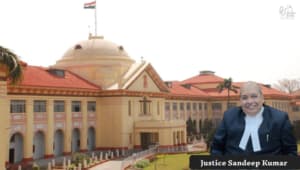The Supreme Court of India, while hearing a Public Interest Litigation (PIL), expressed the view that users must receive prior notice before their social media posts are removed. The case challenges certain provisions of the Information Technology (IT) Rules, which currently allow content blocking without informing the user who originally posted it.
A bench comprising Justices BR Gavai and AG Masih directed the Union Government to respond to the petition filed by the Software Freedom Law Centre. The petition questions the legality of content removal without notice and argues that the affected users must be informed before any such action is taken.
“Both of us... prima facie, we feel that the rule has to be read in that manner... that if a person is identifiable, then notice has to be given...” – Justice BR Gavai
Read Also:- Government Expands Aadhaar Authentication to Private Entities Under New 2025 Amendment Rules
Senior Advocate Indira Jaising, appearing for the petitioner, contended that the current IT Rules violate principles of natural justice. She emphasized that the government primarily issues takedown notices to intermediaries, such as social media platforms, rather than notifying the content creators (originators) directly. Jaising clarified that the petition does not challenge the government’s power under Section 69A of the IT Act but rather questions the lack of due process in ensuring that identifiable individuals are informed before their content is blocked.
The bench closely examined Rule 8 of the 2009 IT Rules, which states that either the originator or the intermediary can be issued a notice. Jaising argued that this phrasing results in intermediaries being informed while the content creator remains unaware. She also raised concerns about Rule 16, which mandates confidentiality regarding takedown requests and actions, making it difficult for affected individuals to challenge the decision.
“Suppose the rule can be read in a manner, that if a person is identifiable, then a notice has to be given to such identifiable person... and if a person who has posted, or is host, is not identifiable, then notice has to be given to an intermediary – it is capable of being read in that manner...” – Justice BR Gavai
Read Also:- Mohammed Zubair’s Arrest Stay Extended by Allahabad HC Till Feb 10 in Yati Narsinghanand X Post Case
Jaising further highlighted that confidentiality provisions prevent users from seeking judicial review of takedown decisions. Citing the case of Senior Advocate Sanjay Hegde, she noted that his social media account was suspended without notice and remained blocked for years.
“I am not trying to give personal examples, but this is in the public domain, he had gone to the High Court...” – Senior Advocate Indira Jaising
The petition seeks key changes to the IT Rules, including the quashing of Rule 16 to ensure transparency, making notice issuance mandatory for identifiable users, amending Rule 8 to ensure both intermediaries and content creators are notified, and introducing a standard format for takedown notices with all necessary details. It also calls for disclosure of the number of takedown actions taken under Rule 8 and Rule 9, publication of Review Committee findings under Rule 14, and records of proceedings under Section 15 to allow affected individuals to seek legal remedies.
The Supreme Court has now issued a notice to the Union Government, requesting a response on the matter. The case has significant implications for digital rights, free speech, and the regulation of social media content in India.
Case Title: SOFTWARE FREEDOM LAW CENTER, INDIA AND ANR. Versus UNION OF INDIA AND ANR., W.P.(C) No. 161/2025















